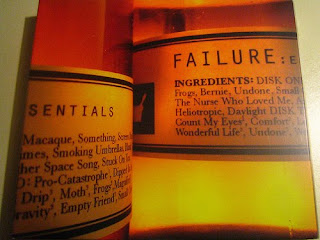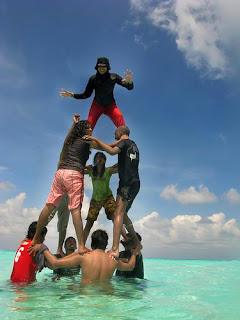 Alisa Bowman's website says it all: Pull it up and the tab will read "Alisa Bowman: Creates bestselling books." New York Times Bestsellers. Major national magazines. She knows what she's doing. And I don't mind saying that she's thoughtful, kind and helpful.
Alisa Bowman's website says it all: Pull it up and the tab will read "Alisa Bowman: Creates bestselling books." New York Times Bestsellers. Major national magazines. She knows what she's doing. And I don't mind saying that she's thoughtful, kind and helpful.But is she confident? Alisa answered a few questions to explain how she got where she is now and where confidence plays a role there.
When you started freelancing, where would you place your professional confidence level, on a range of 1 (who me? I'll fade into the wallpaper over here) to 5 (I'm great! Let me tell you more!)? Why?
I started freelancing in 1990 and I didn't even think about my confidence or my writing abilities back then. I freelanced after a few years with a newspaper, a few years in book publishing and a few years at a magazine. Initially, I freelanced for people I knew--all of whom I'd worked with before. I knew exactly what they wanted, so the relationships were easy. Boy, I yearn for those days again! Anyway, I've never been one of those full-of-myself people. The day I tell someone that "I rock" will be the day the day I'm on some sort of wonder drug. So I won't give myself a 5, but I definitely didn't have as much to worry about back then. I'll say I was a 3.5.
Where would you place your professional confidence now, on the same scale?
Now I'm a 4, but for different reasons. My career is a lot more demanding now than it was 10 years ago. The freelance climate has changed. Editors have higher expectations of freelancers than ever before. I'm at a point in my career, too, when people have very high expectations of me. I've been a part of 6 best selling books, so authors come to me expecting miracles. Ten years ago, people just wanted me to put words together. Now they want me to make them rich, famous and happy. It's a tall order.
I'm also pushing myself out of my comfort zone. I'm writing on topics -- especially memoir -- that I am not as familiar with. So I feel shaky for the first time in years. I'm also learning how to promote myself, understand technology, and so on. These are things that writers didn't need to worry about 10 years ago. Now, though, I don't just write. I market. I maintain a blog. I delve into photography and photo editing. I'm learning video. I've posed for photos. I've been interviewed on TV. I'm giving speeches. I'm becoming a brand. That's all new to me, so the insecurity factor is higher.
If your confidence level has improved, what do you think made the difference? How did your confidence grow?
Confidence does not grow by staying safe and only writing about what you know. It grows when you push yourself, a little at a time, beyond your comfort zone. Whenever I've stretched in a new direction and did not die as a result, I got stronger and more confident. I was then able to look back on that experience and say, "If I could do ____, then I can do ____." There have been plenty of times in my career when I've wanted to hide under my bed. Whenever I've had that sensation, I've used it as a sign that I needed to face on what scared me JUST FOR THE PRACTICE of facing my fear.
What parts of your professional life still cause you the most insecurity? You told me about a recent bout of bad news that affected your professional confidence. How do you cope when those things happen?
Rejection and revisions still get to me. I am very good at taking feedback and I'm always looking to improve my writing. But lots of revisions generally cause me to blame myself. I think, "I really screwed that up. That editor hates me." In reality, we all get rewritten and edited. If we didn't, the job of "editor" would become obsolete. Also, as my good friend Julie Sturgeon says, we all get tossed into the toilet for a swirly every so often--even the best of us. It doesn't mean that we suck as writers. It means that the situation sucks. I know that, but I don't always feel that.
This may be another way of asking the same question but: Tell me about your demon. You mentioned him privately. What does he say, how does he say it and how do you wrangle him to the ground so you can get up and work again?
My demon says: "You always sucked at writing and you always will. You are a fraud. I can't believe you are still in this business. For Criss Sakes, why do you list those best sellers on your website? You know each and every single one of them was a fluke. You just got lucky. That's all. You suck. You can't write. You are a loser. Pretty soon every editor will know this and no one will hire you and you will eventually starve to death and so will your family."
He's pretty blunt. He's a real swell guy, eh?
How do you cope with those feelings of insecurity?
I write about them. When I am feeling really sucky, I'll post something about it on a writer's discussion board. Or I'll email a friend or post it as a Facebook status update. Or I'll blog about it. I try to use the insecurity as a lesson that can somehow help others. In this case, writing about my demon helps others feel normal and less alone. It also allows me to take the the focus off myself and put it on others. As soon as I do that, I feel better.
Plus, other writers are so supportive and can come up with the perfect pick-me-up. They are writers after all!
There was a time in my life when I did not do this--when I held it all inside. That was during my 20s and I ended up very depressed and in therapy. I've found that being frank, open and transparent has helped tremendously with all of life's little demons.
My premise for this challenge is that all creative people are insecure at some level. Agree or disagree? Why or why not?
Yes, right on. All people are insecure in some way, but creative types even more so. In creative careers, what counts as "good" is so subjective. Edison knew he succeeded in inventing a light bulb when the dang light bulb lit up. But we writers never know for sure if our writing rocks. It's not as if a little computer bell goes off, "ding, ding ding!" to tell us that our work is awesome and that people are going to respond to it. We have to experiment. One way to do this is to blog. The communal nature of blogging gives you instantaneous feedback. You can learn, in real time, how your writing affected those who read it. It's quite powerful.
If you could offer any two suggestions for beginning writers on how to increase their self confidence, what would they be?
Blog. It's the best way to test your writing skills and see if your writing resonates with others.
Practice. I look at life as one huge practice rehearsal. That way, when I screw up, it's not a big deal. I was just practicing. Now I can use the screw up and I can learn from it and become a better writer. When you think of it that way, nothing seems terminal. All writers get better over time. Some of writing is talent, but a lot of it is skill--a skill that can be improved upon with practice.

















